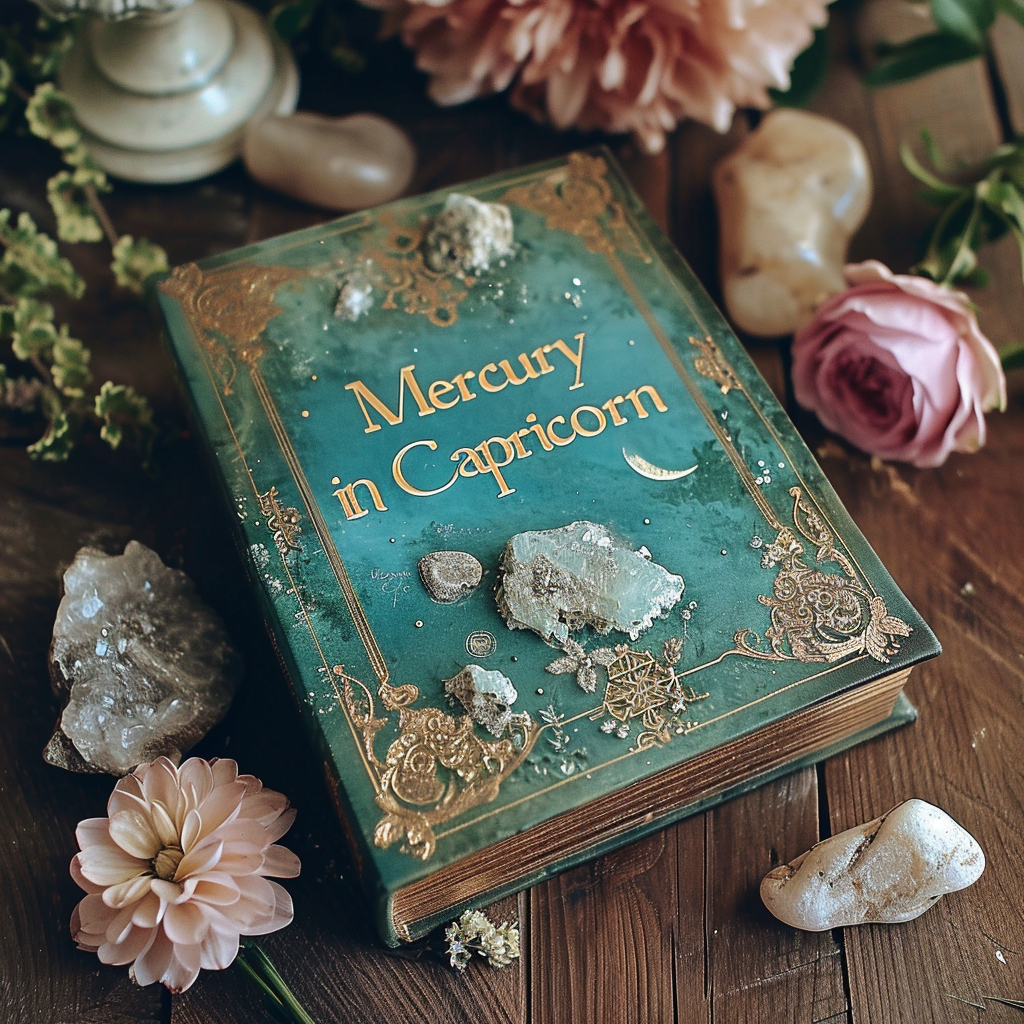
Mercury in Capricorn: The Introspective Sage

These individuals with Mercury in Capricorn, perceive the world through a lens ground in reality. They’re not the ones to fall for fads or chase the latest intellectual trends. No – they build thoughts deliberately, and with an eye on the foundations. And while some may mistake this for pessimism, it’s actually a profound form of respect – for what’s real, for time, and for the weight of words. This Mercury doesn’t frolic in the realms of airy speculation. It plots, it plans, it calculates. It looks at dreams and asks not “is it beautiful?” but “can it stand?” There’s a kind of inherent skeptic in this placement, but it isn’t the cynical sort that rolls its eyes and smirks at everything. It’s the skepticism of the seasoned carpenter who knows what wood warps in the rain. This Mercury doesn’t dismiss ideas flippantly; it subjects them to rigorous trials. It wants to see them survive a winter. It wants to know they won’t crumble when the world leans on them a bit too hard.
Communication here is often tinged with a kind of gravitas. They may not flood you with words, but when they speak, there’s substance. They’re the sort of individuals who could say, “I’ll think about it,” and you’d know they actually will. And underneath all this seriousness, there’s often a surprisingly dry wit—a kind of deadpan humor that can slip past you unless you’re paying close attention. It’s the slow burn of irony, the kind of humor that emerges when you’ve stared at life’s absurdities long enough to start laughing at them just to stay sane.
To possess Mercury in Capricorn is to be gifted—or perhaps tasked—with a mind that’s naturally inclined toward discernment, a kind of seriousness refusing to be blindsided by illusion or hype. It’s as if thought itself has been hewn from stone, shaped by will. A person with this placement doesn’t just want to know what something is—they want to know how it works, whether it’s structurally sound, and if it will still be there tomorrow. They believe in dreams and ideals, but they want them grounded in something that won’t blow away in a stiff wind.
Their analytical powers are capable of revealing form and function beneath even the most chaotic slabs of information. In an era drenched in data and drowning in opinions, these are the people who bring order, making their way through the fog of confusion with logic honed by lived experience.
Business acumen flows through them as naturally as rivers follow gravity. This isn’t because they’re particularly obsessed with profit, necessarily, but because they understand the systems that keep the world ticking. They think in terms of practical outcomes. Where others might flounder in brainstorming sessions full of vague ambition and glittery words, they calmly ask, “Alright, but what’s the budget?” Their communication is often plainspoken, but that’s not to say it’s dull. It’s purposeful, unembellished. They say what they mean, and they mean what they say. In a sea of ambiguity and half-promises, their word is a rock to cling to. This is why, in professional settings, they are valued—because they not only deliver, they deliver what they said they would, when they said they would, in the way they said they would. It’s almost revolutionary, in a world full of excuses and evasions.
Their presence in organizational life is often quiet but transformative. They’re the unseen gears behind the clock face, and the calm in the chaos.
When these individuals speak, each word laid like a brick, each sentence reinforced with the steel of intention. There’s nothing frivolous in their expression. They’re not the types to get swept up in a flurry of fanciful adjectives or speak in metaphors. And therein lies the beauty of their communication: it’s lean, not lacking. Every pause, every considered phrase, is a deep breath before a plunge. They don’t speak unless they mean it, and they don’t mean it unless it’s been through a rigorous internal vetting process. There’s a kind of intellectual integrity here, a moral compass in their mouth. You might not always like what they say—because realism, when stripped of decoration, can be a bit stark—but you’ll believe it.
People are drawn to this quality, even if they don’t always know why. Perhaps because in a world full of bluster and bravado, someone who speaks plainly and sincerely feels like a breath of fresh air. Their advice isn’t cloaked in mysticism or motivational fluff—it’s rooted in experience, thoughtfulness, and a sense of responsibility. They’re won’t try to impress you; they’ll try to help you. And often, they do.
The Realm of Order
There’s no indulgence in the airy vagaries of “what if” or “imagine if we could”—unless this imagining comes with a feasibility report and a risk matrix. Their comfort zone, their strength, their spiritual playground, is in the realm of order—planning, tracking, managing. These individuals can take a tangled knot of information, obligations, and personalities and untangle it all into a schedule that actually works. While others panic over logistics, Mercury in Capricorn calmly aligns timelines, resources, and objectives like stars in a practical constellation. Never for glory, but for functionality. And because their mind is wired for efficiency, they’re often the ones who spot the flaw before it becomes a failure.
They’ll notice the missing signature, the weak link in the chain, the illogical leap in the proposal. Some people may accuse them of trying to be critical, but it is because their mind is calibrated to reality, and reality doesn’t care much for wishful thinking. These are the people who ask the tough, necessary questions. This isn’t to stall progress, but to ensure it has legs to stand on. Their skepticism isn’t bitter—it’s benevolent. It shields them, and often others, from modern-day charlatanism. They have an internal nonsense detector that’s finely tuned. A sort of mental spam filter, if you will. They don’t chase trends, they don’t fall for buzzwords, and they certainly don’t invest in anything because it’s “the next big thing.” They want the numbers. The history. The plan.
Even their creativity—yes, for they are creative—takes on the form of design, of systems, of structures that support life. Their ideas might not glitter, but they will stand. And in a world that loves sparkle but collapses under examination, there’s something deeply noble about that. So if you’ve got someone with Mercury in Capricorn managing your project, consider yourself blessed. They won’t promise the stars—but they’ll deliver every single time.
The Whole Thing Mapped Out
In professional settings, they are the implementers. You won’t see visionaries spinning in the clouds, but the grounded minds laying the path so others can get there without tripping over their own ambition. Authority seems to follow them because they exude the sort of calm confidence that makes others feel safe. Their peers instinctively look to them when things get misaligned, because there’s something deeply reassuring about a person who doesn’t panic when the everything crashes or the budget evaporates into thin air. Mercury in Capricorn simply adjusts the plan, revises the numbers, and proceeds—because they’ve already got three contingencies mapped out.
They bring to their work the energy of someone who genuinely cares that things are done properly. They don’t skip steps, they don’t gloss over problems, and they certainly don’t make decisions based on gut feelings or vibes. They investigate, they interpret, and then they act—with the quiet conviction of someone who’s not guessing, but knows. Their genius, if we may call it that (and we should), lies in transforming disorder into direction. Give them a jumbled mess of conflicting responsibilities, fractured timelines, and vague instructions, and they will emerge an hour later with a color-coded plan, a risk analysis, and three action points. It won’t be flashy or flamboyant—but utterly indispensable.
This isn’t about being robotic or unemotional. Far from it. There’s heart in their method. They care about outcomes because they care about people. They want things to work. Mercury in Capricorn understands that chaos creates stress, and structure is a form of kindness. Efficiency isn’t only an economic virtue—it’s a form of compassion, a way to make life smoother for everyone involved. Over time, their reliability becomes legend. The person who always meets the deadline. The one who sees the pitfall before anyone else. The one who doesn’t need micromanaging because they’ve already managed themselves. They don’t necessarily seek praise or accolades—if anything, they might find excessive praise a bit awkward—but their results and their reputation precedes them.
The Authoritative Mind
You see, their so-called “authoritative” air isn’t some tyrannical impulse to control, but rather the natural gravitas of someone who has done their homework. Their leadership isn’t a show of force; it’s a demonstration of forethought. It’s this commitment to excellence—not perfection, mind you, but excellence—that underpins everything they do. They don’t chase praise, nor are they dazzled by titles. What moves them is the satisfaction of a job well done, a plan that worked, a bridge that didn’t collapse under pressure.
There’s something deeply reassuring about a person who doesn’t panic, who listens more than they speak, and who speaks only when they’ve actually thought about what they’re going to say. Teams feel safe with them. Even if their compliments are rare, they are sincere. Even if they don’t woo you with wild optimism, they walk beside you when things get tough—and often that’s what matters most. This is not someone who promises everything and delivers dust. No—Mercury in Capricorn shows up, stands firm, and keeps their word. There’s a kind of spiritual weight in their companionship, a sense that here is someone whose loyalty doesn’t flutter in the wind, whose opinion hasn’t been bought by trends, and whose insight comes not from instinct alone, but from earned understanding.
Mercury in Capricorn individuals do things properly. Every comma checked. Every calculation re-verified. Every angle assessed. It isn’t a matter of being neurotic; it’s about honoring the integrity of the task. Because to them, producing something flawed is a betrayal of the responsibility they feel toward their own standards. That’s why, when they do speak, people listen. Not because they’re shouting, but because everyone knows: this person has thought it through. And oh, how they think it through. While others might blurt, bounce, or bluster, these people engage in a kind of intellectual due diligence. Every idea is put through a kind of inner tribunal—scrutinized, weighed, and tested before it sees the light of day. You won’t get speculation for the sake of sounding clever. You won’t get half-formed hot takes disguised as insights. What you will get is something measured, clear, and credible.
There’s something beautifully stoic about this. A kind of resistance to the modern mania of immediacy. They are, in a way, intellectual traditionalists. They want the foundation before they build the argument. They want to know the structure can bear weight before inviting others to stand on it. This isn’t only academic or professional—it bleeds into how they express themselves in daily life. You won’t often catch them in an emotional frenzy, making sweeping statements or impulsive judgments. They consider. They reflect. They respond. Like a wise elder who knows that words have weight and therefore should be carried with care.
The Restrained Communicator
They are not ones to spout off at the mouth. They don’t dabble in half-baked theories or fling about wild ideas. No, they want facts. They want the scaffolding built before the banners go up. And while this is splendid in a courtroom or when managing risk, it can leave them looking a touch distant or disengaged in those environments where free thought is currency and uncertainty is part of the fun. Their communication style reflects a deep inner ethic: Do not speak unless you have something of value to say. It’s noble. But it can become a kind of cage. A fear of speaking before every stone is set in place. And sometimes, in conversations that require imagination more than information, this restraint can be mistaken for aloofness, or worse, indifference.
But beneath this careful composure is a mind often brimming with imagination. It’s just that their imagination wears a sensible coat and carries a well-thumbed notebook. They can be creative. They do have ideas. But they want those ideas to work. And they want to share them without feeling like they’re shouting into a void of vague enthusiasm. So what’s to be done? They don’t need to abandon their natural caution—it’s what gives their voice its rare credibility. Rather, it’s a gently loosening the reins. Recognizing that sometimes, speculation is a pathway toward the right answer. Creativity doesn’t have to be chaotic. They can explore without commitment, imagine without obligation, and speak without a thesis statement.
By leaning occasionally into the unknown—by allowing a little improvisation into their usually composed mind—they can expand their range without betraying their nature. They can participate in brainstorms without having to rain on them. They can open up to abstract musings without compromising their credibility. In doing so, they become even more powerful communicators.
The Observer
In the realm of teamwork, they are the silent spine. Rarely are they the ones shouting for attention or dominating brainstorming sessions with a scattergun of half-formed ideas. No, they sit back, they watch, they listen, they process. And when they finally chime in, it’s with an insight, shaped by observation and backed by internal due diligence. Like a wise owl emerging from a library, blinking in the daylight just long enough to say something that makes everyone else go, “Oh. Yes. That’s exactly it.” Their focus, consistency, and ability to see a task through from planning to execution make them indispensable team members. They’re the ones staying late until they get it right, and they won’t sleep until it is.
In social circles, they are the one you find yourself drawn to when the music dips and you need a moment of realness. Sit with them long enough—perhaps with a cup of tea and a pause between topics—and you’ll find an entire treasury of insight tucked behind those watchful eyes. Their words are deliberate, but their wisdom is abundant. Others begin to notice this. They realize, often quite quickly, that when Mercury in Capricorn speaks, it matters. You won’t find fluff. It’s thought, distilled into usefulness. And so, people seek them out. For sense-making. For a voice that doesn’t rise and fall with every whim, but remains steady.
Of course, their more reserved nature can sometimes be mistaken for detachment. They may hover at the edge of the circle rather than the center. But those who take the time to engage with them find something deeply comforting: someone who won’t interrupt, won’t exaggerate, and won’t abandon the topic halfway through. Someone who takes you seriously.
The world is not a playground for the Mercury in Capricorn mind—it is a project. Everything they encounter is sifted through this pragmatic, discerning lens. Conversations are opportunities for meaningful exchange. Writing is a construction. A crafted document. And learning? Learning is a tool for building a better life, a more efficient system, a more refined understanding of how the machinery of existence operates. Their thoughts, shaped by this Saturn-tinged Mercury, don’t scatter like seed in the wind. They are planted, cultivated, watched over with patient determination. They seek to apply their knowledge. Theories are fine, but show them the results. Show them how it works. Give them something they can use.
Yet, for all this seriousness, there’s a quiet beauty in the way they perceive the world. Their appreciation for structure and logic isn’t cold—it’s reverent. There’s something deeply human in the way they prize meaningful order. In a world spinning faster each day with clickbait and chaos, Mercury in Capricorn says, “Slow down. Check your facts. Build something that lasts.” This influence doesn’t merely shape what they say—it shapes what they notice. They’re attuned to inconsistencies, practical flaws, gaps in logic. Their questions in a meeting aren’t there to to fill the air—they’re the ones that stop the whole room and make everyone go, “Hmm. Good point.” Because they’re thinking through.
Ideas Need Testing
Mercury in Capricorn has a mind that learns slowly, but once it’s there, it’s there for life. This is no passing fancy or shallow dip into trivia. Knowledge here is curated, archived, cross-referenced and shelved with reverence. But it can be difficult to convince such a mind to let in something new without a membership card and three references. The preference for the familiar and the established is not born from respect. Respect for what has lasted. For what has been tested. These are not the folks who leap onto the bandwagon of the latest app or change because it’s fashionable.
This caution, while often their greatest strength, can slow their adaptation to change. But once they’ve done the due diligence, once the information has been examined, understood, and deemed worthy, their integration of that knowledge is profound. What takes others a weekend crash course might take them a bit longer—but once it’s in, it’s rock solid. They’re retainers. And what’s more, they know exactly where to find that bit of knowledge when they need it. When a problem arises, they don’t panic—they consult the inner manual of tested solutions. While others rush to improvise, they recall what worked.
Mercury in Capricorn has a trust in what has been tried and tested. Their trust in tradition isn’t blind nostalgia; it’s a form of insurance. It’s the belief that the wisdom of the past carries clues for surviving the present. And while this might make them wary of the shiny new thing, it also makes them wonderfully reliable in the face of uncertainty. Still, the great invitation for Mercury in Capricorn is this: to occasionally allow for the possibility that not all value has a long history. Brilliance can arrive unannounced, untested, even unrefined. Some ideas need time to prove themselves—but deserve, at least, a seat at the table in the meantime.
The Anxious Mind
It’s this very seriousness that makes their minds so trustworthy—but also, at times, rather heavy with the burdens of “what if.” You see, their natural orientation isn’t toward boundless optimism or spontaneous leaps of faith. It’s toward containment, control, and the safety of the known. Worry, for Mercury in Capricorn, is a mechanism. A mental rehearsal. A way of being prepared. But oh, how easily a bit of healthy caution can become a kind of mental shackle, chaining them to their own sense of responsibility. They feel the weight of consequences before they’ve even acted. And so, they plan, they pause, they analyze. This isn’t melodrama—it’s prudence. But prudence, when left unchecked, becomes pessimism.
Their realism, their refusal to be swept away by seductive but shaky ideas, is a gift in a world bloated with marketing and misinformation. But the downside is a kind of ideological calcification. They can become so grounded in the tried-and-tested that the mere suggestion of an untested method feels like a threat to stability. It’s as if their mental operating system has a built-in firewall against anything marked “unproven.” And this, while protecting them from error, also limits their ability to evolve. Change feels like chaos. Unconventional solutions feel like gambles. They’d rather stick with the old toolkit—even if it takes longer—than risk using something shiny but suspicious.
Herein lies the invitation: to consider that flexibility is not the enemy of order—it’s its evolution. Sometimes a new idea might not have a pedigree, but it could still have potential. And worst-case scenarios, while useful in preparing, don’t always come to pass. In fact, sometimes, against all odds, things go better than expected. Mercury in Capricorn doesn’t need to become reckless or fanciful to thrive—they simply need to make space for possibility.
Beyond all of this seriousness, they’re the dry witted intellectual with a poker face and a mind like a steel trap. They’re the person in the room who delivers a line so subtle that it takes a beat to register—and when it does, the room erupts, or at least offers a knowing smirk. Their humor isn’t brash or loud. No slapstick here, thank you very much. It’s dry, bone-dry, like vintage red wine or the desert at dusk. You need to lean in to catch it—and this is half the fun. Their sarcasm isn’t the type that seeks to wound, but to reveal. Often, their humor pokes gentle fun at the nonsense parading itself as wisdom. They don’t shout their punchlines; they’re cleverly tucked between clauses, nestled in a half-smile or an arched brow. And for those who get it, it’s a little reward for being present, for paying attention.





 Venus-Pluto Synastry: A Love So Powerful That It Might Just Kill Them
Venus-Pluto Synastry: A Love So Powerful That It Might Just Kill Them
 Moon Conjunct Pluto Synastry
Moon Conjunct Pluto Synastry
 Reflections on a Past Venus-Pluto Synastry Aspect
Reflections on a Past Venus-Pluto Synastry Aspect
 Mars Conjunct Pluto Synastry
Mars Conjunct Pluto Synastry
 Venus Trine Pluto: Dark Desires
Venus Trine Pluto: Dark Desires
 Mars-Pluto Synastry: Something Quite Dark and Dangerous
Mars-Pluto Synastry: Something Quite Dark and Dangerous
 Mars in Aquarius: Sex drive
Mars in Aquarius: Sex drive
 Sun Square Pluto Natal Aspect: I Am Titanium
Sun Square Pluto Natal Aspect: I Am Titanium
 Venus Trine Mars Synastry
Venus Trine Mars Synastry
 Sun Square Pluto Synastry: You’ve Got That Power Over Me
Sun Square Pluto Synastry: You’ve Got That Power Over Me
 Uranus Transits 8th the House: Rebirth from Chaos
Uranus Transits 8th the House: Rebirth from Chaos
 Mars Conjunct Pluto Natal Aspect: From Ember to Inferno
Mars Conjunct Pluto Natal Aspect: From Ember to Inferno
 Venus in the 5th House
Venus in the 5th House
 Scorpio’s Cold Withdrawal
Scorpio’s Cold Withdrawal
 Moon in the 8th House: At Home in the Underworld
Moon in the 8th House: At Home in the Underworld
 Mercury Square Pluto Natal Aspect
Mercury Square Pluto Natal Aspect
 Pluto Transits Moon: A Time to Grieve
Pluto Transits Moon: A Time to Grieve
 The Twin Journeys of Saturn’s Returns
The Twin Journeys of Saturn’s Returns
 Uranus Transits: 1st House: Winds of Change:
Uranus Transits: 1st House: Winds of Change:
 Moon Conjunct Mars Natal Aspect
Moon Conjunct Mars Natal Aspect